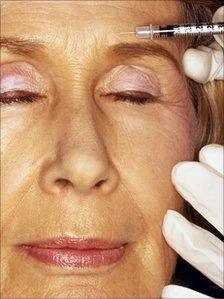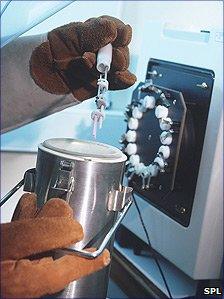Do you really want to live forever?
- Published

Science is striving to reverse the ageing process so we can all live longer, but that does come with its drawbacks, says Joan Bakewell in A Point of View.
Last week scientists at Harvard medical school reversed the ageing process in elderly mice. Please don't get excited, unless you're a mouse that is. The application to humans is a long way off and even if it will one day be possible, there are many issues attendant on a population that has the means to live forever.
Harvard's research will be welcomed by two entirely different groups of people. Instantly, and possibly without too much thought, by those who pander to and encourage the wish of women not to "lose their looks" as they grow older. Nobody loses their looks, they just have different looks.
But by a universally agreed norm, within our culture beauty carries a prize. Ever since Paris offered the apple and Helen launched a thousand ships, we have known that beauty, especially in women, offers an easier life, more attention, more opportunities, friends, lovers, gratification.
I hope you won't argue with me in this - in my own small way I've lived it. I was once thought pretty, now young people give up their seat to me on the Tube. Life brings many changes and growing old involves adapting to them.
Creepy
Women in their 40s and 50s find it hard when the first wrinkles hit. They are a sitting target for a multi-million pound cosmetics and skin care industry that makes glamorous commercials only just this side of legally acceptable, promising to slow the ageing process of the female body. Along come the geriatric mice and their hopes soar. But the promise of eternal youth has deluded more than Dorian Gray. No need to make space just yet for the painting in the attic. The human body ages, get used to it.

Women go to extremes to look younger
The other eyebrows that will be raised by the news from Harvard belong to the scientists around the world who are now engaged on the serious matter of ageing and how it happens. Medical intervention once seemed limited to curing us of diseases that kill. In my childhood, diphtheria and scarlet fever still carried people off, I had friends crippled by polio and aunts deformed by rickets. All this seemed the proper field for medical intervention.
We seemed to accept that the big killers struck people in late middle age - most often, it seemed to me as a child, cancer, which was then an ill-defined umbrella term referred to in hushed whispers as "the big C".
We all know what happened next, a great swathe of advances in hygiene and medicine drove the major killers on to the back foot. From a combination of better lifestyle, cleaner cities and the benefits of a free health service, people began living longer.
We hear regularly of the latest treatments for coronary heart disease, breast cancer, kidney failure, and we live in the belief that when we have an unwelcome diagnosis the full force of medical knowledge will be marshalled for our benefit. We have come to expect better. Now we want life to go on forever.
There are people frantic for eternal life. A few years ago I met people who were vesting their savings in the cryogenic movement - a movement that undertook to freeze your body after you were dead and keep it until such time as science came up with the solution to whatever had killed you, at which moment you could be defrosted, cured, and resume your life.
Dogma
Little attention was being paid to two serious disadvantages: what might the world be like when you emerged from the deep freeze, would they still have iPods and aeroplanes, supermarkets and killer heels. And secondly, why would anyone bother to defrost you when you had already paid up and had no possible means of redress. Who would want to resurrect a cluster of damp and out of date individuals, who would merely hang around adding to the world's population problem?
Incidentally, I understood that some deluded individuals who didn't have enough money for the whole body treatment were told they could have their head alone frozen, and expect it to be stitched onto any available body when the time came. Science fiction can't get much creepier.
While most of us don't want to live forever, many of us would enjoy living longer. At the same time we would like the planet to survive as we know it. There is a contradiction in contemplating a world where everyone lives much longer and where the planet's resources are finite.
Unless we can learn to eat sand we should bear in mind the fates of places like Angkor Wat and Easter Island, places once dense with people and culture now empty ruins. Populations have died out or been massively relocated before now. Again, science fiction lurks in the wings. Flights to Mars anyone?
The fine line we have to travel is one that we are currently mapping out. There are no precedents. We must measure the gains to our ageing population of today's fast-developing medicine against the problems created globally. To even approach this subject is to invite reproach.
When China judged the rapid growth of its population needed control and instituted state policy of a one child family, other cultures threw up their collective hands in horror. This smelled to them of eugenics, of selective breeding, of Hitler's worst fantasies. It is indeed a harsh dogma. When I was there in the 80s it was explained to me that you could break the rule as long as you incurred penalties. If a family had a second child they were downgraded in the claim they had on state housing. And so on, another child and further penalties.
Flesh
I don't know whether this system still operates in today's China, but we have seen its impact more recently when a school collapsed killing some of the pupils. The anguish of parents was as agonising as any others and we could sympathise fully with that. Added to it was the awareness that many had lost their only child.

Cryogenics involves deep freezing
But let's stay close to home for in truth there are many dilemmas on our own doorstep. I read this week of a new business launched in October that will for a fee freeze stem cells taken from teeth, fat, bone marrow and other tissues in the belief that such fresh stem cells, once unfrozen, will be of better use than older stem cells in curing ailments that develop later in life.
This is a private commercial venture, but university departments around the country are conducting stem cell research that will help us recover from illnesses that would otherwise kill us. Others are looking into the further possibility of using animal parts for transplants. There is talk of work on Alzheimers, on multiple sclerosis.
Gerontology itself - the study of ageing - is a big growth area. And all this is fine, we are in the right place at the right time, though perhaps some of us are a little late for the anti-ageing bonanza that could be on the way in Britain. I don't worry about that. I have other concerns.
The prospect of more years is of course inviting - living to see the grandchildren marry, watching the tree you planted with such care grow to its full height, seeing our rivers flow clean and full of fish again, all lifestyle pleasures that we would relish.
But there is another prospect and one already known to too many in our communities. It is a life lived in isolation, our earning lives over, our efforts to sustain some life in the mainstream rejected, families far away or indifferent or both.
The occasional and erratic visits from a changing medley of inept carers, food not as we once relished it, but half cooked, half cold, dumped on us by those eager to be gone. The home we know getting shabby, the garden that was once our pride overgrown and run to seed. I wonder what runs through the minds of such people when they read of brave new developments made by scientists in their prime?
As for ourselves, our bodies, Shakespeare had it right: "Second childishness and mere oblivion, sans teeth, sans eyes, sans taste, sans everything." There is more to life than the flesh and while science is brilliantly keeping us ever fit and alert, something else is needed. And there are no specialists for that.
We all know what it is. In our homes comfort and warmth - literally in blankets and proper heating - but also in our hearts, friendship and laughter, story telling and ideas, reminiscence and nostalgia, an old photo album shared, favourite meals recreated. All these are the bric-a-brac of daily life, things the young may dismiss as trivial as they hurtle through their hectic schedules
But they too, we hope will be old one day and we need to get the template right for when its their turn. After all, everyone is ageing at every moment of their lives, it's just that some of us are ahead of the rest.